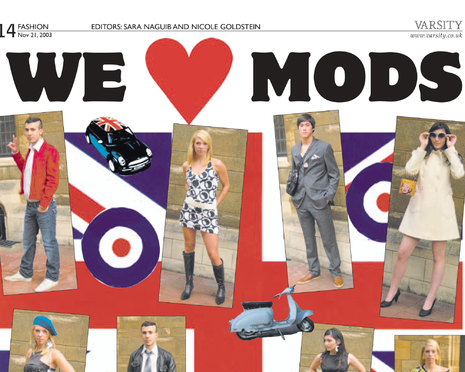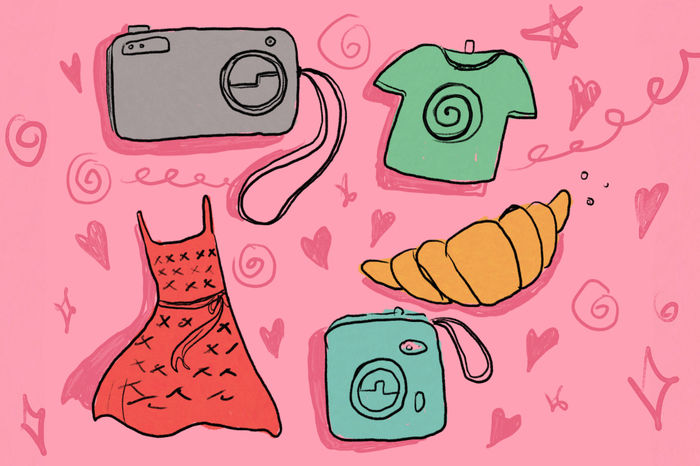Vintage Varsity: Vintage tackles vintage
Resident Varsity archivist Annia Krzoska looks at how Varsity’s fashion section has moved with the times

In November 2003, Varsity’s Fashion section contained a photoshoot inspired by 1960s ‘Mod Fashion’. The female models sported patterned shift dresses and the men donned colourful suits – though each outfit had its own early 2000s flair. Before ‘Vintage Varsity’ was a column, our predecessors had to innovate with their nostalgic tributes. Looking through the archives from the early 2000s, this photoshoot is a perfect – but not the sole – example of how this was achieved. Vulture, in particular, paid a lot of homage to the past; old books (from the 1900s), old clothes, and even ‘old’ music show their faces in articles across the years.
It is no secret that fashion moves in cycles. Now, y2k is ‘in’, just like how Mod fashion seemed to be making a return in 2003. Still, the photoshoot is an ode to ‘vintage’, much like the Vintage Varsity column today. Although a dress and leggings combo seems to ‘modernise’ one of the retro dresses, it is also an example of students doing what they can with what they have. Instead of paying homage to a current trend, the article pays tribute to the past. A good comparison would be to look at the 1950s shops around Cambridge. The 50s may not be ‘in’ beyond certain subcultures, but the nostalgia accompanying vintage fashion is still very much appreciated. Varsity’s 2003 article is very open about the source of the outfits, all of which came from local second-hand shops. Not only is the article praising ‘vintage’, but it is also making use of real retro outfits. The photoshoot does not seem to use authentic 60s clothes, but it captures the essence of the silhouettes and patterns. Thinking metaphorically, the article is essentially a ‘Vintage Varsity’ column in pictures, not just a flashback to old trends.
“Thinking metaphorically, the article is essentially a ‘Vintage Varsity’ column in pictures”
The Fashion section is one of several places where vintage has tackled vintage. In November 2001, the Arts section called back to a 1999 exhibition at the National Gallery. Although the difference between 1999 and 2001 is hardly as extreme as that between 1960 and 2003, an article today that looked back to 2022 would not be ‘current’. The article is nostalgic, calling the 1999 exhibition ‘admittedly wonderful’ while critiquing the gallery’s continued reliance on Renaissance artwork as ‘a little too New Labour for me’ – an interesting simile. Though the first exhibition was still (very obviously) in living memory, the Arts section took the time to reflect on the past. Comparing past and present is one way to see how we have progressed in form and ideas, even if the subject is as simple as the interpretation of Renaissance art. We can see where values change or stay the same, and assess how various advancements in studies can find expression in the most unlikely places.
The same edition later discusses the ‘classic novel’, just as many articles do today. This version of the ‘classic novel’ differs from the traditional definition. Moving away from Shakespeare and Spenser, it discusses ‘Stalin’s favourite novelist’. The review talks about the book as though it were new, giving a modern breath to ‘Vintage’ literature – just like the fashion article discussed above ‘modernised’ vintage outfits. Literature is often considered timeless. Still, reading a semi-recent novel through the lens of historical developments certainly assists analysis. Returning to the 2003 article on Mod fashion, it is worth reflecting briefly on the politics of fashion. Y2k fashion was heavily inspired by trends long gone. Short skirts represented liberation and the colours of the 60s and 00s gave a retrospective sense of positivity. In both cases, the nostalgia of clothing becomes its rose-tinted glass. The 00s were not all fun and games, nor were the 60s. When we reflect on ‘vintage’ our interpretations are often shaped by a purpose. Just as the earlier National Gallery exhibition was praised above its successor, our nostalgic reflections feel ‘brighter’ in hindsight than in reality.
 News / Right-wing billionaire Peter Thiel gives ‘antichrist’ lecture in Cambridge6 February 2026
News / Right-wing billionaire Peter Thiel gives ‘antichrist’ lecture in Cambridge6 February 2026 Features / From fresher to finalist: how have you evolved at Cambridge?10 February 2026
Features / From fresher to finalist: how have you evolved at Cambridge?10 February 2026 Film & TV / Remembering Rob Reiner 11 February 2026
Film & TV / Remembering Rob Reiner 11 February 2026 News / Churchill plans for new Archives Centre building10 February 2026
News / Churchill plans for new Archives Centre building10 February 2026 News / Epstein contacted Cambridge academics about research funding6 February 2026
News / Epstein contacted Cambridge academics about research funding6 February 2026










